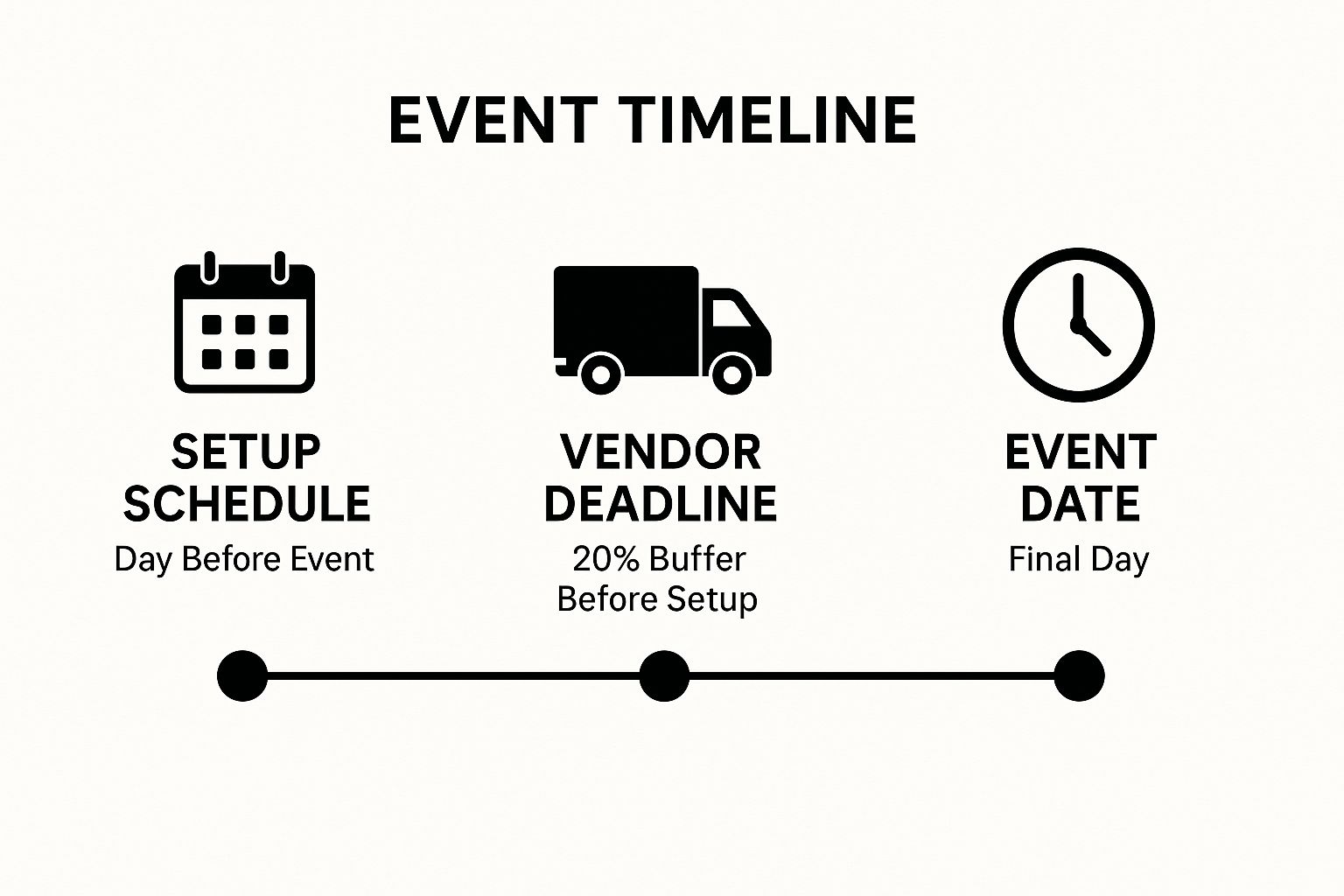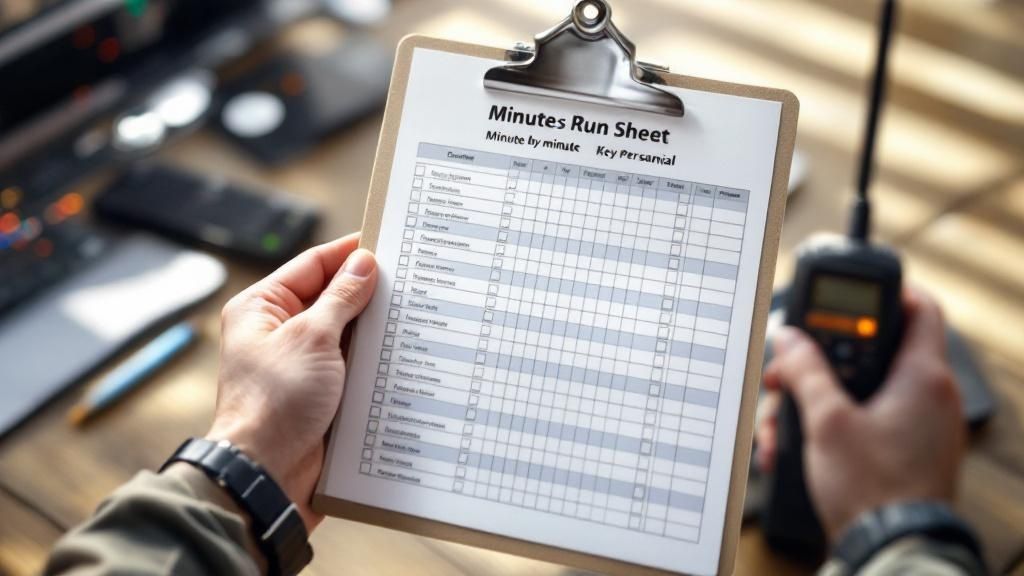Welcome to the fast-paced world of event planning, where every detail matters and a cool head is your greatest asset. Whether you're orchestrating a dream wedding, a high-stakes corporate launch, or an intimate charity gala, the principles of flawless execution remain the same. But with trends constantly shifting and guest expectations higher than ever, how do you stay ahead of the curve and consistently deliver standout results? This is where having a solid set of event coordinator tips becomes crucial, moving you from simply managing tasks to strategically designing experiences.
We've compiled a powerhouse list of actionable strategies that go beyond the basics. This isn't just another checklist; it's a strategic guide packed with insights to help you master budgets, streamline vendor management, and create unforgettable moments for every guest. We'll dive deep into risk management, on-site leadership, and leveraging technology to make your job easier and your events more impactful. While a comprehensive event planning checklist provides a fantastic foundation for what to do, our guide will show you how to do it with expert precision. Let’s get started on transforming your good events into truly great ones.
1. Master the Art of Detailed Planning and Timeline Creation
Every spectacular event, from a global conference to an intimate wedding, is built on the foundation of a rock-solid plan. This is one of those event coordinator tips that’s non-negotiable. Creating a comprehensive timeline isn't just about scheduling; it’s about reverse-engineering success. By starting with your event date and working backward, you can map out every single task, deadline, and checkpoint, ensuring nothing gets missed.
This systematic approach transforms event coordination from a frantic, reactive scramble into a calm, proactive process. Think of the meticulous planning behind major events. The Met Gala operates on an 18-month timeline with weekly milestones, while corporate giants like Salesforce use detailed 6-month backward timelines for their conferences. This level of detail allows for strategic decision-making and gives you room to handle unexpected challenges without derailing the entire event.
Actionable Tips for Timeline Mastery
To implement this, you don't need to be planning an Olympic-sized event. The principles scale perfectly for any occasion.
- Work Backward: Start with the event date and map out major milestones in reverse. When does the venue need final numbers? When do invitations need to be sent? This creates a clear path to follow.
- Embrace Technology: Use project management tools like Asana, Monday.com, or Trello to build your timeline. These platforms make it easy to assign tasks, set deadlines, and track progress collaboratively.
- Build in Buffers: Life happens. Pad your schedule by adding a 20% buffer to each major task deadline. If a vendor needs a final decision by the 15th, set your internal deadline for the 12th.
- Create Audience-Specific Timelines: Your vendors don't need to see your client's payment schedule, and your client doesn't need to know the caterer's load-in time. Create simplified, separate timelines for your team, vendors, and clients to keep everyone focused on what’s relevant to them.
The following infographic illustrates a simplified backward timeline, highlighting critical checkpoints like vendor deadlines and setup schedules leading up to the main event.

This visual shows how building a 20% buffer before the setup day provides a crucial safety net for vendor confirmations, preventing last-minute crises. By mastering your master timeline, you can create more specific schedules, like a day-of reception plan. For a detailed example, check out this wedding reception schedule template. Ultimately, a well-crafted timeline is your single most powerful tool for executing a flawless event.
2. Develop a Comprehensive Vendor Management System
Your event is only as strong as its weakest link, and often, that link is a vendor. This is why one of the most crucial event coordinator tips is to go beyond simple booking and develop a sophisticated vendor management system. This isn't just about having a list of contacts; it's about curating a network of trusted, vetted partners who become extensions of your team, from caterers to A/V technicians.

This systematic approach to partnerships is how industry giants operate. Live Nation leverages preferred vendor lists across dozens of countries to ensure consistency, while celebrity planner Marcy Blum builds deep, collaborative relationships that enable incredible creative execution. Your vendor network is your most valuable asset, providing the reliability needed to solve problems and seamlessly deliver for your clients. A well-managed system transforms vendor interactions from a transactional necessity into a strategic advantage.
Actionable Tips for Vendor Mastery
Building a world-class vendor network is an ongoing process that pays dividends on every event you plan.
- Create a Vendor Scorecard: Develop a checklist to evaluate potential partners on criteria like responsiveness, flexibility, pricing transparency, and client reviews. This moves your selection process from gut feeling to a data-driven decision.
- Always Have a Backup: For critical services like catering, transportation, and A/V, you must have a pre-vetted backup vendor ready to go. This single step can save an event from total disaster.
- Organize Contracts and Communications: Use a centralized system, whether it's a shared drive or a CRM, to store all contracts, insurance certificates, and communication history. This creates a single source of truth for your entire team.
- Build Relationships Beyond the Event: Schedule quarterly coffee check-ins or quick calls with your key vendors. Building a genuine relationship with decision-makers, not just sales reps, fosters loyalty and can lead to better service and flexibility when you need it most.
When developing your system, it's crucial to consider implementing robust vendor management best practices to streamline processes, reduce risks, and maximize value from your partnerships. This structured approach is particularly essential when you plan corporate events, where stakes are high and vendor integration is key. For more on this, you can explore detailed guides on how to plan corporate events. Ultimately, a strong vendor management system gives you the confidence and resources to execute any event flawlessly.
3. Implement Rigorous Budget Management and Financial Tracking
Financial mastery is the unsung hero of event coordination. A stunning event can quickly become a client's nightmare if the budget spirals out of control. This tip is all about moving beyond a simple spreadsheet and adopting a proactive, rigorous approach to managing every dollar, ensuring you protect both your client's investment and your own profitability. It’s about creating a financial roadmap that guides every decision, from vendor selection to decor choices.
This level of financial discipline is what separates amateur planners from seasoned professionals. For instance, large-scale corporate events managed by agencies like Jack Morton Worldwide use real-time dashboards to track spending against projections, preventing any chance of overruns. Similarly, high-end wedding designers like Preston Bailey build their reputation on radical financial transparency, providing clients with detailed breakdowns and regular updates. This approach isn't just about accounting; it's about building trust and delivering value without compromising the event's vision.

Actionable Tips for Budget Mastery
Adopting these financial best practices will give you complete control and confidence, regardless of your event's scale.
- Build a Contingency Fund: Always allocate a 15-20% contingency line item in your initial budget. This isn't "extra" money; it's a necessary buffer for unexpected costs, last-minute changes, or unforeseen opportunities.
- Track Expenses Weekly: Don't wait for major milestones to reconcile your budget. Set aside time each week to update expenses and track spending against your plan. This allows you to catch potential issues early.
- Leverage Technology: Use accounting software like QuickBooks or FreshBooks to automate tracking, invoicing, and reporting. This saves time and reduces the risk of human error.
- Provide Transparent Reporting: Schedule monthly budget reviews with your client. Go through line items, show where the money is going, and discuss any potential adjustments. This transparency builds immense trust.
Mastering the budget means you can make smarter decisions about where to allocate funds, such as investing in high-quality vendors. For example, understanding your financial flexibility is key when considering different packages; you can find more on this in our wedding videography tips. Ultimately, rigorous financial tracking is one of the most critical event coordinator tips for executing a successful event that meets both creative and financial goals.
4. Create Detailed Event Day Operations Plans and Run Sheets
If the master timeline is the event’s skeleton, the run sheet is its central nervous system, dictating every action in real time. This is one of the most critical event coordinator tips for flawless execution. A run sheet, or "show flow," is a minute-by-minute blueprint for event day, detailing every activity, transition, cue, and responsibility. It ensures every team member and vendor knows precisely what to do, when to do it, and who is in charge.
This document transforms the chaos of a live event into a manageable, synchronized sequence. Think of the immense operational complexity behind the Academy Awards ceremony, which relies on 300+ page run sheets with second-by-second timing. Similarly, music festivals like Coachella create individual run sheets for each stage, vendor, and activation to keep the massive event running smoothly. This level of detail allows for seamless execution and gives your team the confidence to handle any issue that arises.
Actionable Tips for Run Sheet Mastery
A bulletproof run sheet is the key to a stress-free event day. Here’s how to build one that works.
- Use a Consistent Format: Develop a standard template for your run sheets. This helps your team quickly understand their roles and responsibilities across different events without having to learn a new format each time.
- Color-Code Everything: Assign different colors to various segments (e.g., green for guest arrival, blue for keynote speakers, red for catering) or teams. This visual organization makes the document scannable during high-pressure moments.
- Include Phonetic Pronunciations: For any names that might be difficult to pronounce (speakers, award winners, VIPs), include a phonetic spelling right in the run sheet to avoid embarrassing on-stage mistakes.
- Number Each Line Item: Numbering every entry (e.g., 1.1, 1.2, 2.1) makes it incredibly easy to reference a specific action during radio communication. "We are behind on item 14.3" is much clearer than "We are behind on the thing after the first speaker."
- Distribute and Debrief: Send the final run sheet to all relevant stakeholders at least 48 hours in advance. Then, conduct a full run-through or pre-event briefing with your core team to ensure everyone is aligned.
This next video provides a great walkthrough on how to structure a day-of timeline and run sheet, which is essential for any coordinator.
The run sheet is the ultimate source of truth on event day. For those focusing on weddings, a comprehensive day-of coordinator checklist can help you build the perfect run sheet. You can see a detailed example of what to include in this wedding day-of coordinator checklist. Ultimately, this operational plan empowers your team to execute their roles with precision and confidence.
5. Master Communication and Stakeholder Management
Exceptional communication is the lifeblood of successful event coordination. This is one of those event coordinator tips that separates the good from the truly great. It’s not just about sending emails; it’s about strategically managing the flow of information between clients, vendors, team members, and attendees, all of whom have different needs and expectations.
This proactive approach to communication prevents misunderstandings, builds trust, and fosters a collaborative environment. Think about the World Economic Forum in Davos, which employs multilingual communication teams to ensure clarity across a global audience. Similarly, renowned wedding planner Mindy Weiss is celebrated for her white-glove communication, making every client feel like her only priority. This level of intentional communication turns potential chaos into a symphony of collaboration.
Actionable Tips for Communication Mastery
Implementing a strong communication framework is crucial, whether you're coordinating a small party or a massive conference.
- Establish Protocols Early: At the start of any project, ask each stakeholder their preferred communication method (email, text, phone call) and set clear expectations for response times.
- Create a Communication Cadence: Schedule regular updates, such as weekly summary emails or bi-weekly check-in calls, to ensure everyone stays aligned without overwhelming them with constant messages.
- Use Shared Platforms: Leverage tools like Google Drive, Slack, or dedicated event platforms to create a central hub for all important documents, contracts, and real-time updates. This minimizes confusion and ensures everyone is working from the most current information.
- Tailor Your Message: Your communication style should adapt to your audience. Provide vendors with detailed logistical specs, while giving executive stakeholders a high-level overview of key milestones and progress.
- Document Everything: After a phone call or meeting where decisions are made, send a follow-up email summarizing the key points and action items. This creates a written record and confirms everyone is on the same page.
Strong communication is a core pillar of event coordination, as it directly impacts every other aspect of the planning process. To understand its foundational role, you can explore more about what is event coordination. Ultimately, by mastering stakeholder management, you ensure every moving part works together seamlessly, leading to a flawless event experience for everyone involved.
6. Develop Comprehensive Risk Management and Contingency Planning
Great events feel effortless, but behind the scenes, a skilled coordinator has anticipated every potential pitfall. This is where proactive risk management becomes one of the most crucial event coordinator tips you can master. It’s about moving beyond the happy path and creating detailed contingency plans for everything that could go wrong, from a sudden downpour to a critical vendor no-show.
This forward-thinking approach is what separates amateurs from professionals. The infamous Fyre Festival is a catastrophic example of what happens when risk management is ignored. In contrast, major events like the New York Fashion Week maintain backup venues for every show, and post-COVID corporate conferences now build in comprehensive health crisis protocols and virtual backup options as a standard. By identifying worst-case scenarios ahead of time, you can respond calmly and effectively, protecting the event and your reputation.
Actionable Tips for Risk Management
You don't need a crisis to start planning for one. Integrating risk assessment into your process is a powerful strategy for any event size.
- Create a 'What If' Checklist: During the early planning stages, brainstorm potential problems. Categorize them: weather, technical failures, vendor issues, medical emergencies, and security. What if the power goes out? What if a keynote speaker is delayed?
- Establish a Command Chain: When a crisis hits, there’s no time to debate who’s in charge. Designate a clear chain of command for making emergency decisions so your team can act swiftly.
- Secure Backup Vendors: Cultivate relationships with secondary vendors for critical services like catering, AV, or entertainment. Have their contact information ready so you can activate a backup with a single call.
- Prepare an Emergency Kit: Keep a well-stocked kit on-site with first-aid supplies, a multi-tool, gaffer tape, extra batteries, and contact lists. This simple box can solve dozens of minor-to-moderate problems.
- Review Contracts and Insurance: Ensure all vendor contracts include a force majeure clause to protect you from unforeseen circumstances. Likewise, secure appropriate event cancellation and liability insurance to shield your client and your business from financial loss.
Ultimately, contingency planning isn't about being pessimistic; it's about being prepared. This preparation builds confidence, ensures a smoother execution, and allows you to handle unexpected challenges with the calm authority of a true professional.
7. Leverage Technology and Event Management Software
In today's fast-paced event landscape, relying solely on spreadsheets and email is like trying to build a skyscraper with a hammer and nails. Embracing event management software isn't just a modern convenience; it’s a strategic necessity. This powerful technology streamlines everything from registration and ticketing to attendee engagement and post-event analytics, allowing you to manage complex tasks with greater efficiency and precision.
This shift from manual to automated processes is one of the most impactful event coordinator tips for scaling your operations. Think of how major events operate. The Consumer Electronics Show (CES) uses augmented reality for booth previews, while Dreamforce leverages its own proprietary tech to manage over 170,000 attendees seamlessly. These tools centralize data, automate communication, and provide invaluable insights, freeing you up to focus on the creative and strategic elements that make an event truly memorable.
Actionable Tips for Tech Integration
You don't need a massive budget to start integrating powerful technology. The key is to choose the right tools for your specific needs and scale from there.
- Start with the Core: Begin with a robust event management platform like Cvent, Bizzabo, or Eventbrite to handle the essentials like registration, ticketing, and basic communication.
- Prioritize User Experience: Choose software with an intuitive interface for both your team and your attendees. A clunky registration process or confusing event app can sour the guest experience before the event even starts.
- Integrate Your Systems: Ensure your chosen platforms can "talk" to each other to avoid manual data entry and information silos. For instance, connect your registration tool to your CRM and email marketing software.
- Always Have a Backup Plan: Technology can fail. Always have a low-tech backup ready, whether it’s a printed guest list, paper signage, or a simple microphone and speaker system in case the main AV system goes down.
- Invest in Training: Don't just buy the software; learn how to use it. Proper training for yourself and your team ensures you're leveraging the platform's full capabilities to maximize your return on investment.
By strategically implementing technology, you can automate tedious tasks, reduce human error, and gather data to prove your event's success. This tech-forward approach elevates your service, delivering a smoother, more engaging experience for everyone involved.
8. Cultivate Strong On-Site Leadership and Team Management Skills
All the meticulous planning in the world means little if the execution on event day is chaotic. This is where a planner transforms into a field commander. Strong on-site leadership isn’t just about telling people what to do; it’s about inspiring confidence, making swift decisions under pressure, and maintaining a calm, authoritative presence that guides the entire team through the live event experience.
This shift from planner to leader is one of the most critical event coordinator tips for ensuring a seamless experience. Think of celebrity wedding planner Preston Bailey or the military-grade precision of a Super Bowl event director; their success hinges on commanding respect and orchestrating teams flawlessly in real-time. This leadership ensures that when unexpected issues arise, they are handled smoothly without alerting guests or derailing the event’s momentum.
Actionable Tips for On-Site Leadership
Becoming an effective on-site leader is a skill you can build with intentional practices.
- Conduct a Thorough Pre-Event Briefing: Before doors open, gather your entire team. Walk through the run-of-show, clarify roles, and set expectations. This aligns everyone and sets a professional, collaborative tone.
- Empower Your Team: Delegate decision-making authority to key team members. Trusting your catering captain or AV lead to handle minor issues without your direct approval frees you up to manage the bigger picture.
- Stay Visible and Connected: Don't hide in a back office. Be a visible presence on the event floor. Use radios or communication apps like Zello to stay in constant, instant contact with your key personnel.
- Lead with Calm Composure: Your team mirrors your energy. When a problem occurs, address it calmly and decisively. A panicked leader creates a panicked team, while a composed leader inspires creative problem-solving.
- Hold an Immediate Post-Event Debrief: While everything is still fresh, gather your team leaders for a quick 15-minute debrief. Discuss what went well and identify areas for improvement for the next event.
Event Coordinator Tips Comparison Matrix
| Methodology | Implementation Complexity 🔄 | Resource Requirements ⚡ | Expected Outcomes 📊 | Ideal Use Cases 💡 | Key Advantages ⭐ |
|---|---|---|---|---|---|
| Master the Art of Detailed Planning and Timeline Creation | High – time-intensive setup, ongoing maintenance | Moderate – project management tools and coordination | Clear roadmap, early conflict detection, improved coordination | Large-scale, multi-stakeholder events | Stress reduction, proactive problem-solving, vendor management |
| Develop a Comprehensive Vendor Management System | Moderate – requires relationship building and database setup | Moderate to high – vendor vetting and contract management | Reliable vendor network, priority services, quality consistency | Events with complex vendor needs | Access to preferred pricing, faster issue resolution, streamlined communication |
| Implement Rigorous Budget Management and Financial Tracking | Moderate to high – detailed tracking and frequent updates | Moderate – accounting software and regular data input | Budget control, client trust, cost savings | Budget-sensitive or large-budget events | Prevents overruns, data-driven decisions, protects profit margins |
| Create Detailed Event Day Operations Plans and Run Sheets | Very high – extremely detailed with frequent revisions | High – time, team input, documentation tools | Smooth execution, clear roles, rapid response capability | High-pressure live events | Eliminates confusion, enables coordination, stress reduction |
| Master Communication and Stakeholder Management | Moderate – needs constant engagement and tailored communication | Moderate – multi-channel tools, scheduling | Strong relationships, fewer misunderstandings | Events with diverse stakeholders | Builds trust, faster decisions, reduced anxiety |
| Develop Comprehensive Risk Management and Contingency Planning | High – extensive scenario planning and risk assessment | Moderate – planning time, insurance, backup vendors | Event protection, minimized disruption, faster issue resolution | Outdoor or high-risk events | Reduces stress, protects finances, demonstrates professionalism |
| Leverage Technology and Event Management Software | Moderate to high – learning curve and platform integration | High – software subscriptions, training | Increased efficiency, enhanced attendee experience | Tech-savvy or large hybrid/virtual events | Improves efficiency, data insights, collaboration |
| Cultivate Strong On-Site Leadership and Team Management Skills | High – requires real-time decision-making and stamina | Moderate – communication equipment, team briefings | Smooth execution, empowered team, quick problem solving | Events requiring large teams on-site | Ensures execution, boosts morale, builds reputation |
Turning Moments into Masterpieces
So, there you have it. We've journeyed through the intricate, high-stakes, and ultimately rewarding world of event coordination. From mastering the granular details of backward timelines and creating an almost telepathic vendor management system to navigating the complexities of budget tracking and stakeholder communication, it's clear that exceptional event planning is far more than just a checklist. It's an art form built on a foundation of rigorous science.
The eight core pillars we've discussed are not just isolated event coordinator tips; they are interconnected systems that create a powerful engine for success. A detailed event day run sheet is only as strong as the vendor relationships you've cultivated. Your brilliant on-site leadership thrives because you've already mitigated potential disasters with a rock-solid contingency plan. Each piece reinforces the others, transforming potential chaos into a seamlessly executed, unforgettable experience.
From Blueprint to Reality: Your Key Takeaways
Think of this guide as your new blueprint. The true value isn't just in knowing these strategies but in actively implementing them. Let’s boil it down to the essentials:
- Structure is Your Superpower: Don't leave anything to chance. Detailed plans, run sheets, and documented communication aren't restrictive; they are liberating. They free you up to handle the unexpected with grace because the expected is already buttoned up.
- Relationships are Your Currency: Your network of vendors, your rapport with stakeholders, and the trust you build with your on-site team are your most valuable assets. Nurture them. A vendor who feels like a partner will go the extra mile when you need it most.
- Technology is Your Ally: Embrace event management software, communication apps, and project management tools. They don't replace your expertise; they amplify it, allowing you to focus on the human elements that truly make an event special.
Mastering these concepts is what separates a good event coordinator from a truly legendary one. It's about moving from simply managing logistics to engineering emotions and creating lasting memories. When you internalize these event coordinator tips, you build more than just a successful event; you build a reputation for excellence, reliability, and creative vision. You become the person clients trust implicitly with their most important moments, knowing you have the framework to turn their vision into a stunning, stress-free reality.
Now, take these insights and apply them. Start with one area that feels like a weakness and make it a strength. Refine your client onboarding process, build a new contingency plan template, or test out a new piece of software. Each small improvement contributes to the masterpiece you're building. Go on, create something amazing.
Feeling inspired but want a partner to handle the intricate details? The team at 1021 Events lives and breathes this level of planning, integrating everything from DJ and MC services to sophisticated uplighting and photo booth experiences into a single, flawless package. See how a professional framework makes all the difference at 1021 Events and let's create something unforgettable together.




